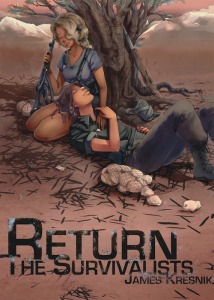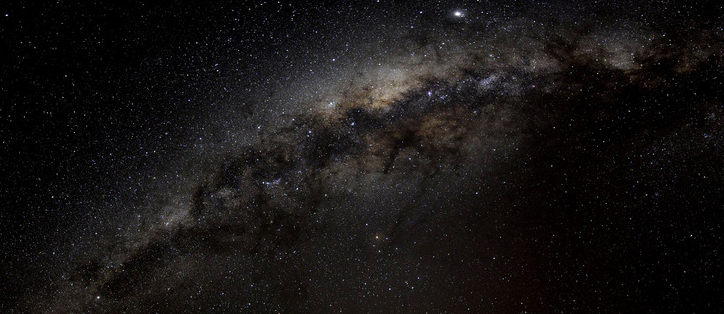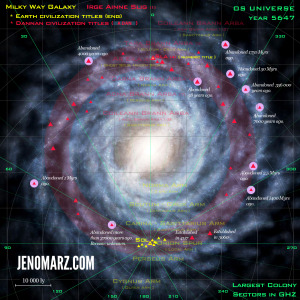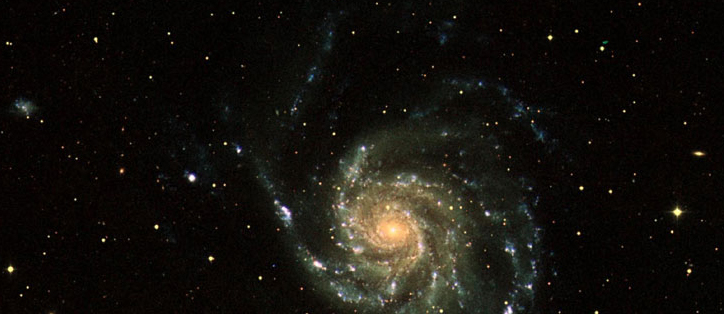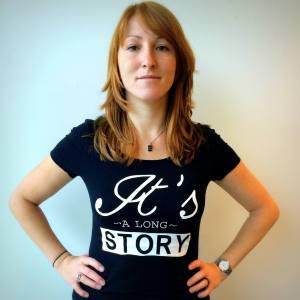It’s time for another interview! Today I welcome a mighty girl: engineer, writer and blogger Paige Daniels.
Paige Daniels is the pen name of Tina Closser. By day she works as an Electrical Engineer and Mom mushing her kids from gymnastics and violin practice. After the kids go to bed, she rocks out with her headphones turned to eleven and cranks out books. She is an über science geek. If she wasn’t married to the most terrific guy in the world, she would be a groupie for Adam Baldwin.
Connect with her on Twitter, Facebook, Goodreads, or stalk her blog.
Now, onto the main course!
[aesop_content color=”#ffffff” background=”#333333″ width=”95%” columns=”1″ position=”none” imgrepeat=”no-repeat” floaterposition=”left” floaterdirection=”up”]
Q: Paige (Tina), you are an engineer with degrees in physics and engineering. How did you come to love the tech field? What inspired you to choose this career? If it’s no secret, what exactly do you do and work on? What do you do [plan to do] to inspire others, particularly girls, to go for STEM?
[/aesop_content]
I know it sounds silly, but I really think it stemmed from my parents’ love of science fiction. We were always watching Star Trek or some crazy sci-fi movie. I was totally obsessed with being an astronaut or nun.
When I was in school there was not a lot of career planning all I knew is I liked science so I went into physics. I got about a semester from graduating with my physics degree and decided maybe engineering would be a better path. So I just fell into it.
I work for a Navy lab as the STEM coordinator, which is basically a liaison between our lab and local schools.
Right now I’ve started a makerspace for kids 12 – 16, to show students that technology and science can be fun and quite beautiful at times. I do activities with my local chapter of Society of Women Engineers to inspire girls to discover engineering.
[aesop_content color=”#ffffff” background=”#333333″ width=”95%” columns=”1″ position=”none” imgrepeat=”no-repeat” floaterposition=”left” floaterdirection=”up”]Q: Now, onto your writing part of life. What are your favorite genres to work in? What genres, if different from what you write in now, do you plan to tap into in the future? What are your favorite themes to write about and why?
[/aesop_content]
I love science fiction, but I’ll pretty much read any genre. Right now I don’t have any plans to write in any other genres, but maybe a political thriller would be fun. I like to write about family and I don’t just mean the traditional mom, dad, and kids. To me a family can be so much more. I like to explore the interaction of the different people. Also, like to write about the underdog.
[aesop_content color=”#ffffff” background=”#333333″ width=”95%” columns=”1″ position=”none” imgrepeat=”no-repeat” floaterposition=”left” floaterdirection=”up”]Q: When did you start writing? What was the main drive? Inspiration? What fandoms do you belong to?
[/aesop_content]
I’m kind of a late bloomer. It wasn’t until my thirties. But ever since I was a kid I was always reading an imagining different twists to stories or TV show, what I would’ve done better.
The wonder gift of boredom is what got me writing. I hate this story idea burrowing its way through my brain and it wouldn’t leave me alone. Concurrently, I just finished my master’s degree and I was in a habit of sitting at my computer writing. So I thought I’d give it a try and if I hated it I’d stop.
I have to say I’m pretty picky about what I read / watch. I’m not saying that I have the best taste just that it’s hard for me to get into stuff. I guess my biggest fandoms are: Star Trek: TNG, Chuck, and Firefly. I could watch those shows on repeat and never get sick of them.
[aesop_content color=”#ffffff” background=”#333333″ width=”95%” columns=”1″ position=”none” imgrepeat=”no-repeat” floaterposition=”left” floaterdirection=”up”]Q: Do you like experimenting with fiction? How do you describe your writing style?
[/aesop_content]
I’m pretty conservative, but I’m also new to this writing thing. I’d like to explore some other themes.
Very sparse, I don’t like delving into details much. I like a lot of punchy action.
[aesop_content color=”#ffffff” background=”#333333″ width=”95%” columns=”1″ position=”none” imgrepeat=”no-repeat” floaterposition=”left” floaterdirection=”up”]Q: What fuels your writing? Beer? Coffee? Wine? Warm socks? Where and when do you like to write? What is your creative process? Do you write elaborate outlines or are you are pantser?
[/aesop_content]
Beer, definitely beer.
Usually after the kids go to bed, in front of the TV.
I think of an idea in the car while jamming to tunes and I think for a long time on it, probably too long. Then I start outlining and researching and outlining again. Then I start the actual writing, then repeat the process.
[aesop_content color=”#ffffff” background=”#333333″ width=”95%” columns=”1″ position=”none” imgrepeat=”no-repeat” floaterposition=”left” floaterdirection=”up”]Q: What is your favorite scene to write? Romance? Action? What kind of scenes do you find hard to write, if any? Why? What aspect of your writing do you feel is strongest, and what needs the most improvement?
[/aesop_content]
I like to write romance scenes and I like to write scenes with lots of snappy dialog, I find dialog the easiest to write. The hardest is action. I have to constantly proof them to make sure what I wrote was physically possible or if there were continuity errors. There have been many times when I wrote fight scene and I totally forgot I handcuffed the characters in the first paragraph only to have them duking it out in the third paragraph.
I’ve been complimented on my dialogue and I’m pretty comfortable with that. I’m least comfortable with descriptions and introspective talk.
[aesop_content color=”#ffffff” background=”#333333″ width=”95%” columns=”1″ position=”none” imgrepeat=”no-repeat” floaterposition=”left” floaterdirection=”up”]Q: Now, let’s talk about what you write. You are working on the third book of the Non-Compliance trilogy, which is scheduled for release in January 2015. Tell us about the books of the series. What do you think about writing series in general?
[/aesop_content]
Non-Compliance takes place in a not too distant dystopic future where the government has forced everyone to implant a tracking chip or be forced to a Non-Compliant Sector that are backward ghettos run by organized crime. I admit the theme isn’t super original, but I feel the characters are what makes this trilogy special. I like writing a series; for me, the hard part was summing it up in three books, but I didn’t want readers to think the books overstayed their welcome. I wanted to leave the readers wanting more.
[aesop_content color=”#ffffff” background=”#333333″ width=”95%” columns=”1″ position=”none” imgrepeat=”no-repeat” floaterposition=”left” floaterdirection=”up”]Q: Who are your main characters of the trilogy and what makes them special?
[/aesop_content]
There is actually a pretty full cast of characters and I loved writing them. The main character, Shea, was one of my main inspirations for writing the series. She’s a nerd and she’s okay with that. I didn’t feel like there were a lot of nerdy strong women characters out there. Sure there are the Black Widows that are sexy and kick butt, but what about the nerdy girls who like to program or solder or work on cars? I also thought it would be cool for the nerdy girl to get the guy. Although the characters aren’t related by blood, they are a tight-knit family.
[aesop_content color=”#ffffff” background=”#333333″ width=”95%” columns=”1″ position=”none” imgrepeat=”no-repeat” floaterposition=”left” floaterdirection=”up”]Q: Which path(s) have you taken: traditional publishing, self-publishing, or both? How was your experience?
[/aesop_content]
I started out self pubbing the first book of the series just because, for me, it was like saying ‘I’m done goal met.’ Then Kristell Ink contacted me about publishing the story. I’ve been pleased about the process and I’ve learned a lot I really feel if I didn’t get picked up by them I probably wouldn’t have written the second and third book. They really motivated me. I’ll probably self-pub again, now that I have more knowledge in my back pocket.
[aesop_content color=”#ffffff” background=”#333333″ width=”95%” columns=”1″ position=”none” imgrepeat=”no-repeat” floaterposition=”left” floaterdirection=”up”]Q: What form of marketing works best for promoting your work(s)? What social media do you like the most? Why?
[/aesop_content]
So far it seems word of mouth, like with real people, works the best.
Probably Facebook. It seems to have the best reach, plus I can screw around there and market at the same time. I’m still learning about marketing.
[aesop_content color=”#ffffff” background=”#333333″ width=”95%” columns=”1″ position=”none” imgrepeat=”no-repeat” floaterposition=”left” floaterdirection=”up”]Q: Tell us about the Brave New Girls project. Do you intend to continue with similar books in the future apart from your main projects?
[/aesop_content]
Brave New Girls is just evidence that you shouldn’t drink and Facebook, just kidding. Seriously, I was chatting with Mary Fan, fellow author about how we should write a story about robots together because we both love bots. Somehow that blossomed into getting a YA anthology together with the theme of girls in technology then we thought it would be cool to donate the proceeds to Society of Women Engineers scholarship fund.
[aesop_content color=”#333333″ background=”#ffffff” columns=”1″ position=”none” imgrepeat=”no-repeat” floaterposition=”left” floaterdirection=”up”]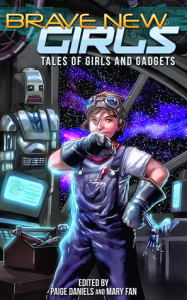 [/aesop_content]
[/aesop_content]
[aesop_content color=”#ffffff” background=”#333333″ width=”95%” columns=”1″ position=”none” imgrepeat=”no-repeat” floaterposition=”left” floaterdirection=”up”]Q: What are you working on right now? What is your next project? What readers should expect?
[/aesop_content]
Right now I’m editing Book 3 in the Non-Compliance series and my Brave New Girls short story.
I’m not sure what my next project is. I’ve been toying around with this super heroine comic book action type story for a long while and a space opera.
Readers should expect for whatever it is to take a long time. I’m a slow writer and I have lots going on.
[aesop_content color=”#ffffff” background=”#333333″ width=”95%” columns=”1″ position=”none” imgrepeat=”no-repeat” floaterposition=”left” floaterdirection=”up”]Q: What do you do apart from writing and day job?
[/aesop_content]
When I have time I play viola, but usually I’m pretty busy with kids, work, writing, and robots I don’t practice too much.
[aesop_content color=”#ffffff” background=”#333333″ width=”95%” columns=”1″ position=”none” imgrepeat=”no-repeat” floaterposition=”left” floaterdirection=”up”]Q: Where can people find more about you and your work(s)?
[/aesop_content]
My website nerdypaige.com and Brave New Girls project. Samples and short stories on Wattpad.
Thank you for participating, Paige.
~~~
New release? A giveaway party? Let us know! Want to do an interview or a guest post for my blog and join the fun? Click here.
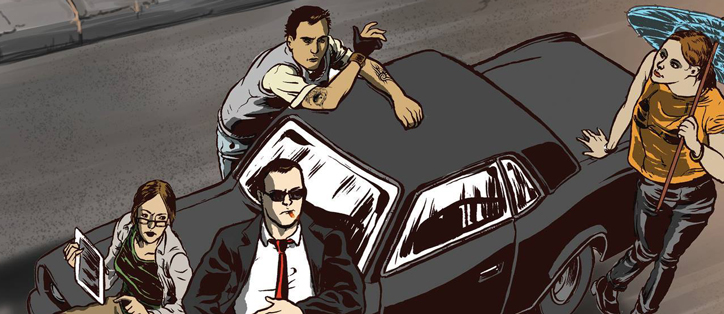
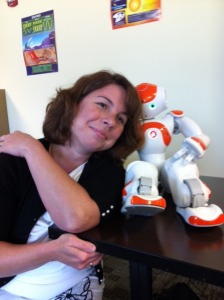
![Non-Compliance: The Sector [Kindle Edition]](http://ws-na.amazon-adsystem.com/widgets/q?_encoding=UTF8&ASIN=B00DJIEO16&Format=_SL250_&ID=AsinImage&MarketPlace=US&ServiceVersion=20070822&WS=1&tag=jenmarscificw-20)
![Non-Compliance: The Transition [Kindle Edition]](http://ws-na.amazon-adsystem.com/widgets/q?_encoding=UTF8&ASIN=B00FH06822&Format=_SL250_&ID=AsinImage&MarketPlace=US&ServiceVersion=20070822&WS=1&tag=jenmarscificw-20)

